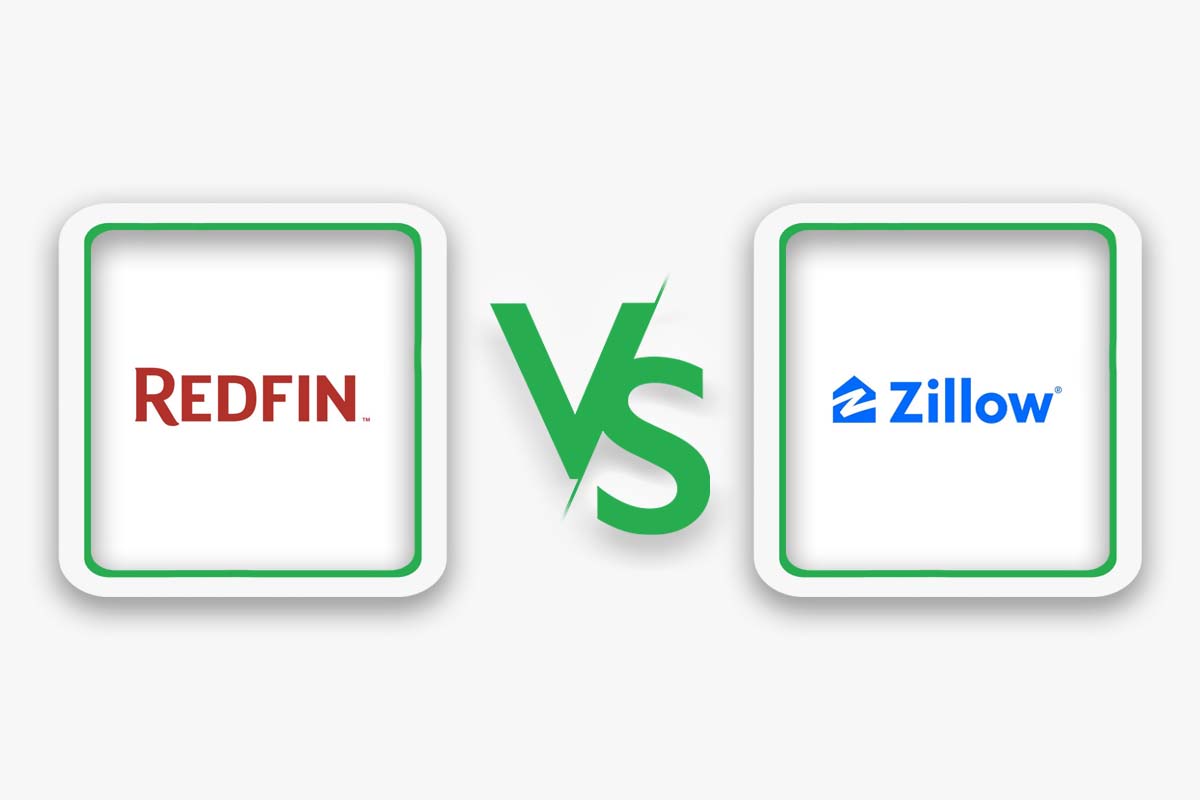

We may earn revenue from the products available on this page and participate in affiliate programs. Learn More ›
Much of the real estate experience has gone digital, which has perks. It’s much easier to find a home online from the comfort of the couch instead of driving around for an entire afternoon seeking out “For Sale” signs. Similarly, filling an open house is much easier for sellers and their agents when hundreds of people can see the listing online. But with so many online real estate sites, it can be hard to know where to start and which ones are the best. Redfin and Zillow are two of the most popular, but some significant differences exist. We’ve done the hard work for buyers and sellers by breaking down the nitty-gritty on Redfin vs. Zillow to determine which one stands out.
About Redfin
Redfin is an online real estate brokerage that pulls its listings from multiple listing services (MLS), and the site is updated at least every 5 minutes. Its primary benefit is its lower-than-average fees that save sellers money, and a significant part of Redfin’s revenue comes from fees on properties sold through the site. Redfin is an anagram of the words “finder” and “friend,” positioning it as an approachable yet exclusive way to find or sell a home.
About Zillow
Zillow is not a brokerage—it is an online real estate listing site. Contrary to Redfin, transactions don’t happen through Zillow; it’s a source to find listings. Sellers or agents manually list properties on the site; they’re not automatically pulled from the MLS. The Zillow company has acquired several smaller real estate sites, which has contributed to making it the most popular listing site online.
- Learn more with our Zillow review.
| Redfin | Zillow | |
| Type of site | Online brokerage | Listing site |
| Average monthly users in 2022 | 44 million | 60 million |
| Home selling | Yes | Yes |
| For Sale By Owner listings | Yes | Yes |
| Home buying | Yes | Yes |
| Renting | Yes | Yes |
| Listing fees | 1% to 1.5% | 5% to 6% |
| Home value estimator accuracy | 74% accurate within 5% of sales price | 67% accurate within 5% of sales price |
How We Compared Real Estate Listing Sites

- Coverage area: It’s important to note whether the user’s real estate site of choice operates in the place where they want to buy or sell. Some sites may have restrictions where they only work in specific markets.
- Home selling: Analyzing specific facets of a real estate listing site concerning the seller experience is vital to ensure that sellers receive enough value from listing on the site.
- Home buying: Similarly, it’s important to note whether a real estate listing site has any particular benefits or features designed to improve a buyer’s search and buying experience.
- Rental listings: Properties for sale are the focus of many real estate listing sites, but these sites often have sections to search for rental properties. Renters will want to know how extensive a site’s rental listings are and if there are any specific benefits to applying for a rental on that site.
- Property listings: How are property listings displayed, and what appears within the listing? Clean and intuitive interfaces are vital for ensuring users stay on the site.
- Home value estimators: Many real estate sites have built-in home value estimators. These estimators run on algorithms, and while they’re not as accurate as actual appraisals, they can help give sellers an idea of what a property is worth or help buyers decide what to bid.
- Additional site tools and features: Are there other features that make the site stand out or provide significant value to buyers or sellers? These can be the features that make a user choose one site over the other.
- Real estate agent availability: Real estate listing sites often allow users to connect with agents (if they aren’t already working with one). The ease of connecting with an agent and the agent’s engagement through the site will be of utmost importance.
Redfin vs. Zillow: Coverage Area
Zillow is the country’s most visited real estate listing site, which makes sense as it lists properties from all 50 states and Washington, D.C. From metropolises to remote communities from coast-to-coast, Zillow lets users search for listings. On the other hand, Redfin only operates in specific markets or geographic areas. This is because it pulls from the MLS, and the markets Redfin is in are where it has access to the MLS. Redfin operates in over 100 markets and has a similar number of listings as Zillow, so most users will still be able to benefit from using Redfin, but some areas may be excluded.
Verdict: Zillow operates in all 50 states and Washington, D.C., meaning buyers, sellers, and renters in metro and remote areas alike can take advantage of Zillow’s services. Conversely, Redfin is active in over 100 “markets,” and its reach is limited by the MLS data it can access.
Winner: Zillow
Redfin vs. Zillow: Home Selling
One of Redfin’s perks as an online brokerage is its ability to deliver discounted listing fees. Traditional brokerages average a 6 percent listing fee: 3 percent from the listing agent and 3 percent from the buyer’s agent, and the buyer’s agent commission is typically paid by the seller. For home sales that go through Redfin, the total commission is lowered to 4 percent, with a 1 percent Redfin listing agent fee for those who buy and sell through Redfin (or 1.5 percent for those who only sell through Redfin) and the 3 percent buyer’s agent commission. For example, on a $200,000 home sale, the lower Redfin fees could save the seller $4,000.
Conversely, as Zillow is a site that only lists properties, there is no material benefit like there is when listing through Redfin. Zillow averaged 60 million monthly visitors in 2022, so sellers might believe that the more eyes on their properties, the better. And while this has validity to it, it’s also important to remember that not all visitors are interested in buying a home—some are browsing just to browse. Zillow statistics indicate that 18 percent of site visitors are interested in purchasing a home, so it’s difficult to determine how much benefit there is for a seller on Zillow.
Verdict: By virtue of being an online brokerage, Redfin allows users to buy and sell houses directly through the site, which benefits both the buyer and the seller. It streamlines the process and allows for lower agent-commission fees. Zillow simply lists properties available, so transactions happen independently of the site.
Winner: Redfin

Redfin vs. Zillow: Home Buying
Home sellers who are also buying through Redfin get to pay the 1 percent listing fee instead of the 1.5 percent fee that would be paid for those only selling through Redfin. Redfin claims that those who buy and sell through the site save an average of $7,000. Redfin used to offer a buyer rebate program, but it’s reportedly been shut down, and there’s no longer mention of it on the site. First-time buyers can take advantage of Redfin’s experienced in-house agents, and Redfin claims its agents are within the top 1 percent of those working at any brokerage in the country. Redfin agents vary from those at traditional brokerages; Redfin agents are employees of the company and earn a base salary and bonuses for home sales. So unlike conventional agents, Redfin agents typically have more time to devote to buyers because they’re not as focused on searching for leads.
Zillow’s many listings make it an appealing avenue for buyers who believe they’ll get to see the most properties. Zillow does have slightly more listings than Redfin, and buyers are more likely to find for-sale-by-owner (FSBO) properties on Zillow. This is because FSBO properties were previously not allowed on Redfin, so it’s likely that there still aren’t as many on the site compared to Zillow. However, higher traffic can also mean more competition from other buyers. Zillow listings also have to be manually updated by the sellers or sellers’ agents, which means there can be a delay in new properties going up or properties already under contract being labeled as such. In comparison, since Redfin pulls from the MLS, it’s updated far more frequently—at least every 5 minutes.
Verdict: It’s estimated that Redfin and Zillow have a similar number of active listings at any given time. Redfin is automatically updated at least every 5 minutes, so users can get the most current information. On the other hand, listings have to be updated manually on Zillow.
Winner: Redfin
Redfin vs. Zillow: Rental Listings
Rentals have been part of Zillow’s site since 2006. Zillow has many rental listings available, including nearly 20,000 in New York State, over 38,000 in Florida, and over 42,000 in California. The rental-listing interface looks much the same as the home-buying interface, with a navigable map and snapshots of listings. There used to be a fee to list rentals on Zillow, but as of May 2022, there are no Zillow listing fees for rentals, but there’s an option to upgrade to a premium version of the Zillow rental manager for a fee of $29.99 for 90 days.
Redfin used to be a site exclusively for home buying and selling, but its rental search feature launched in March 2022. As it’s still a relatively new feature, it appears that there aren’t as many rental listings, and many renters may not even know the feature now exists. Regarding listing rentals, property owners or managers will actually have to go through Rent.com, and that listing will then be shown on Redfin. Rent.com isn’t forthcoming about whether or not there’s a fee to list on the site, but reviews mention fees of an unspecified amount.
Verdict: Redfin’s rental feature debuted in March of 2022 and is still gaining traction. Marketing itself as the most visited rental network, Zillow has been in the arena for much longer and boasts more rental listings across the country.
Winner: Zillow

Redfin vs. Zillow: Property Listings
Many users may assume that because Zillow is the most visited real estate listing website that it must have the most listings. And it does—about 1.5 million active listings, according to some sources. However, Redfin isn’t far behind, with about 1.3 million. At that scale, the 200,000-listing disparity isn’t terribly significant, but in areas where Zillow is active and Redfin is not, the difference may be more pronounced.
Regarding the information shown in an individual property listing, Redfin and Zillow both offer fairly comprehensive rundowns, including price, value estimate, square footage, lot size, nearby schools, and neighborhood ratings. As mentioned, Redfin listings are updated more frequently than Zillow’s, which can be delayed by a few days. Frequent updates can be a big advantage, especially when the real estate market is moving quickly, as buyers can know in near-real time what properties are coming onto the market and which ones are going under contract.
Verdict: Both Zillow and Redfin offer comprehensive property listings. However, information on Zillow listings is dependent on sellers and agents making manual changes and updates, meaning information may not always be timely or current. On the other hand, Redfin pulls listings directly from the MLS, and since the site is updated at least every 5 minutes, users can see new listings and transactions in near-real time.
Winner: Redfin
Redfin vs. Zillow: Home Value Estimators
While online home value estimators aren’t nearly as accurate as a professional appraisal, they still provide a ballpark figure that many sellers and buyers consider valuable information. A home value estimator calculates a rough price of what a home would garner for sale in the current market. Zillow and Redfin both offer some of the best home value estimator tools available with relatively high accuracy.
The ways that both sites calculate their estimates are proprietary, so there’s no way for the general public to know precisely what algorithms go into these calculations. Zillow’s Zestimate used to be the most accurate calculation, but relatively recent changes to each company’s algorithms have resulted in the Redfin sale calculator now having a more precise valuation. Redfin estimates have 74 percent accuracy within 5 percent of a home’s actual sale price, while Zillow delivers only 67 percent accuracy. While that may not seem like a significant difference, that extra 7 percent accuracy can manifest into an extra couple of thousand dollars that could materialize when selling a property.
Redfin’s estimates are also updated relatively frequently—about once a week, so the estimates correspond with the fast-changing real estate market. Redfin also regularly updates its accuracy rates, but it appears that Zillow hasn’t updated its accuracy rates since July 2022. And it was at this last update that it became clear that Redfin’s accuracy was superior to the Zestimate.
| Value estimate accuracy in 2023 | Redfin | Zillow |
| Estimate accuracy within 20% of sale price | ~98% | ~98% |
| Estimate accuracy within 5% of sale price | 74% | 67% |
Verdict: Home value estimates are never set in stone, but they can be helpful tools for home sellers to anticipate what they’ll earn on a sale. Once considered the best home value estimator, the Zillow Zestimate has dipped in accuracy in the past several years, and it appears Zillow updates its accuracy rates only about once a year. Redfin’s estimates tend to be more accurate, and Redfin is more transparent with its accuracy rates, updating them on a relatively frequent weekly basis.
Winner: Redfin
Redfin vs. Zillow: Additional Site Tools and Features
Redfin and Zillow both offer features that make the home-search process more convenient. These include calculators like the Zillow affordability calculator and the Redfin mortgage calculator that help home buyers understand how much house they can afford. Zillow and Redfin calculators also have resources for renters and landlords. The Zillow and Redfin apps allow users to access nearly all of the sites’ features from their mobile devices. Both sites also feature a wealth of informational resources to help users feel more confident during the home selling or buying process.
Verdict: Both Redfin and Zillow provide plenty of search filters and interactive maps to make searching for properties easy and intuitive. Both sites also have tools to help users with the buying and selling process, including home-loan finders and refinance calculators.
Winner: Tie

Redfin vs. Zillow: Real Estate Agent Availability
Unless a home is FSBO, a real estate agent or broker will be part of the home selling or buying process. Both Redfin and Zillow allow users to connect with agents if they don’t already have one they’re working with. What separates the two sites is that Redfin agents are site employees, while Zillow offers a repository of local agents who are associated with other brokerages, and users will have to vet these agents individually. Agents can advertise with Zillow to promote their services. Redfin agents are salaried and receive bonuses for sales, which Redfin touts as a benefit for users because agents have more time to focus on existing clients instead of constantly searching for new leads. Redfin claims its agents are within the top 1 percent of those working at any brokerage in the country, which can help buyers and sellers feel more confident in whom they choose to work with. As mentioned, Redfin agents have lower fees—as low as 1 percent for sellers who sell and buy a home through Redfin.
Verdict: Buyers and sellers can connect with agents through both Redfin and Zillow. Redfin employs agents in-house, and they’re in the top 1 percent of agents working at any brokerage in the country, so buyers and sellers have an easier time finding a high-quality real estate agent. Redfin agents also have lower fees—as low as 1 percent. Zillow only offers a platform for buyers and sellers to look for local real estate agents, but users will have to do their own research to find the right match.
Winner: Redfin
Verdict: Redfin has distinct advantages for home buyers and sellers, including low commission fees and top-rated in-house agents. As the most popular real estate site with listings nationwide, Zillow is still worth checking out and using, especially for those searching for rental or FSBO properties.
With its status as an online brokerage, Redfin has some significant advantages, including lower fees, rebates for buyers, frequent site updates, accurate valuations, and hands-on in-house agents. However, as the most visited real estate listing site, Zillow shouldn’t be discounted, especially for those looking for rentals. Ultimately, users can benefit from searching and listing on both sites to get the best of both worlds.
FAQs
While that was a lot of information on Redfin vs. Zillow, some may still have questions on Zillow fees or Redfin values. Here are the answers to some of the most common queries about these two sites.
Q. Which company is bigger, Redfin or Zillow?
Zillow is a bigger company. The site was launched in 2004, and there are over 6,000 Zillow employees.
Q. Is Redfin or Zillow more popular?
Zillow is more popular than Redfin. Zillow is a more established site with more listings, and Zillow advertising has been higher over the years.
Q. Does Zillow or Redfin have a faster sales procedure?
The speed of the sales procedure will have more to do with the home, sellers, and buyers; whether the listing was found on Zillow or Redfin will not have much bearing.
Q. Who has lower fees, Redfin or Zillow?
The fee structure is different for Redfin and Zillow. For properties for sale, there’s no cost to list on Zillow, and transactions don’t happen through the site. Transactions do happen through Redfin, and there is a 1 percent to 1.5 percent fee.
Q. Does Redfin or Zillow have a longer history?
Zillow was founded in 2004, and Redfin was founded in 2006, so Zillow has a longer history.
Q. What are some alternatives to Redfin and Zillow?
Some of the other best real estate websites include Apartments.com and Trulia.
Sources: RubyHome (1) (2), Home Bay, iPropertyManagement, Homelight
